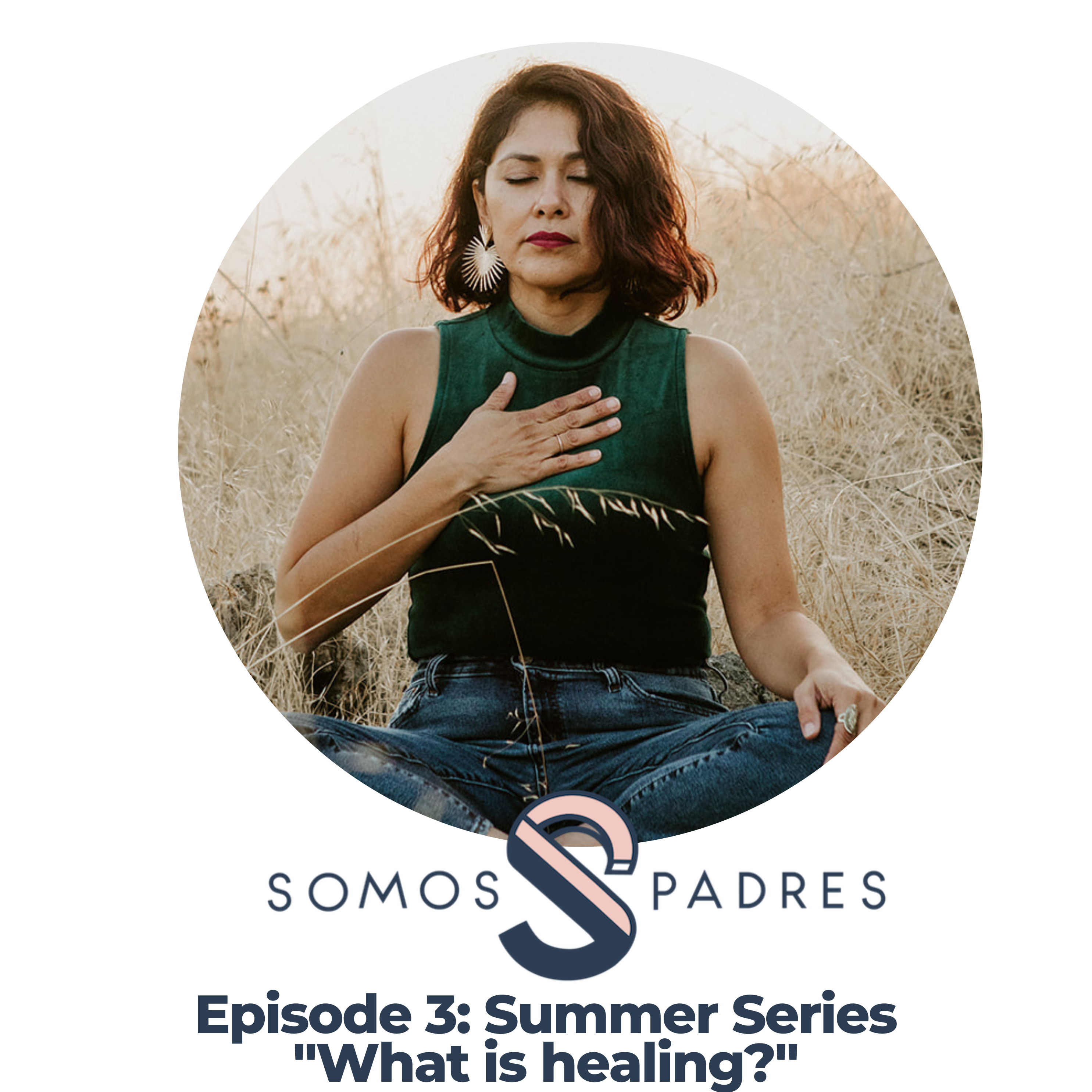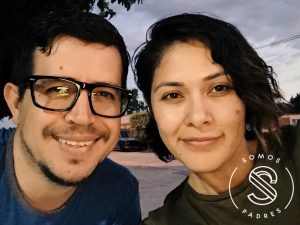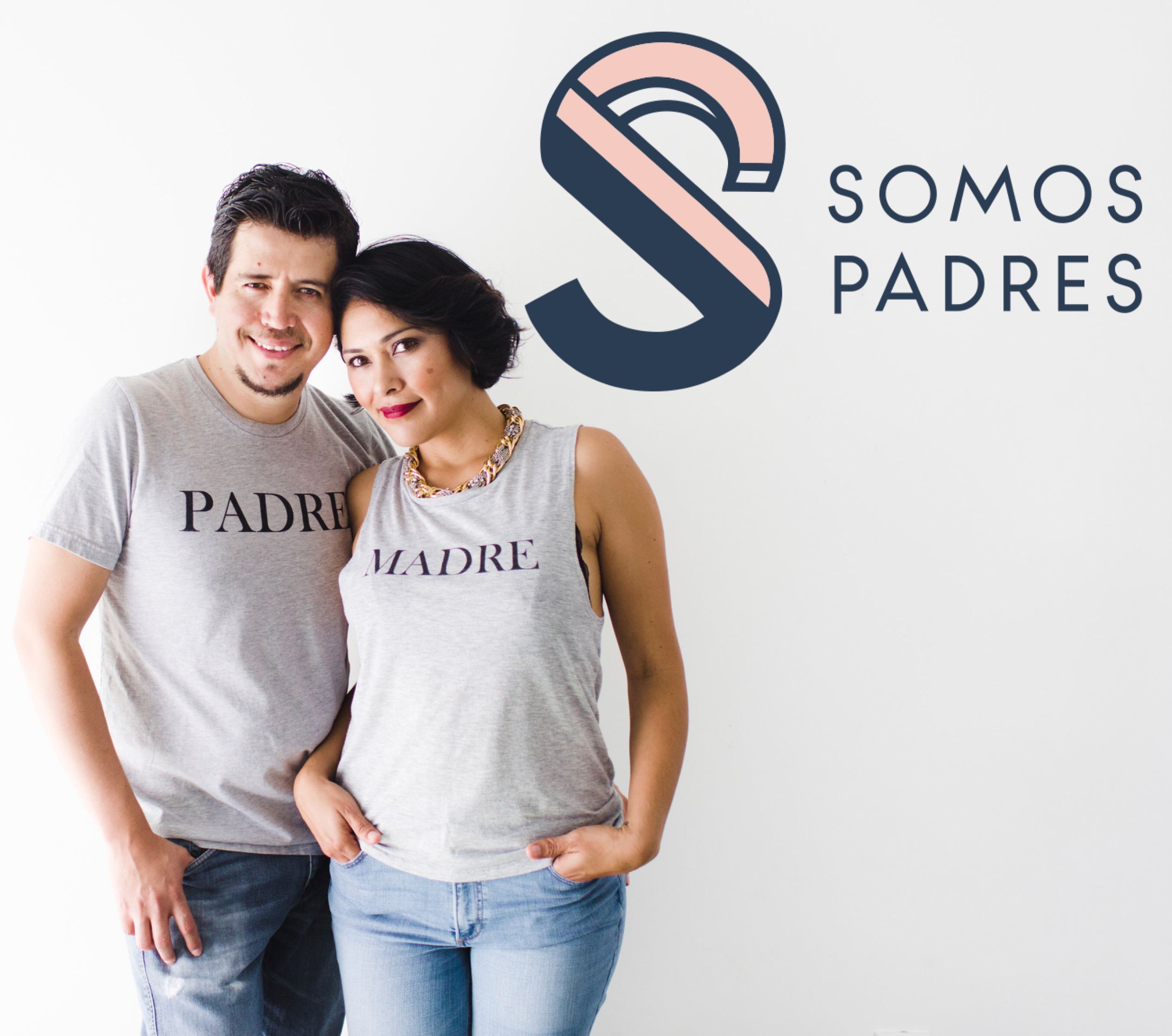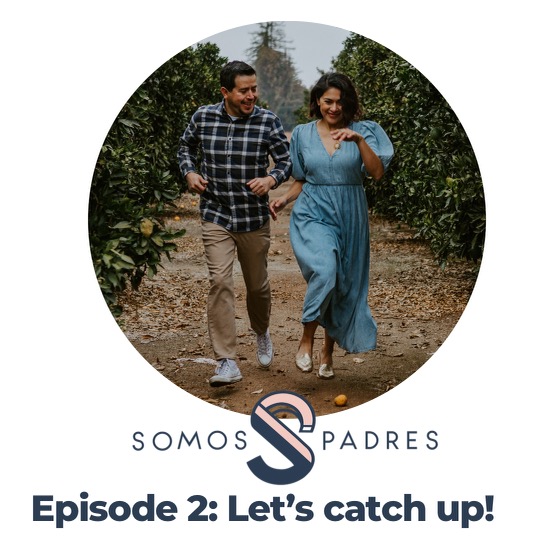Episode Transcript
[00:00:00] Speaker A: Hello, and welcome to Samos Padres!!!
[00:00:03] Speaker B: Podcast dedicated to the constant development over parenting and ourselves.
[00:00:07] Speaker A: We are your hosts, Paolo and Jessenia. Thanks for joining us as we share our parenting experiences rooted within the context of our own life journey.
[00:00:16] Speaker B: In that spirit, we will also be sharing parenting information and the stories of Madres and Padres out there...
[00:00:21] Speaker A: Who have embraced their own personal evolution as the great latest gift of parenthood.
[00:00:27] Speaker B: Here we go.
[00:00:37] Speaker A: And welcome back to the Somos Padres podcast as announced this week. I am back on my own to launch the Summer Series. And in this round of the Summer Series, I really want to talk about my own healing journey. But before we dive right in to me sharing about my different experiences and what I've gained from them and learned from them and integrated, I really want to take a moment. And that's what this first episode is, to set some context to level set around this word of healing, because I do think that this particular word means something different to every person, to different people. I mean, it's used in a lot of different contexts. And so I thought it would be a really great idea to first take some time to talk about what I mean when I'm talking about healing and what this healing journey is. So as I was writing notes for myself around what I wanted to talk about, I noticed that I was like, wow, I even need to do for myself even some level setting, even before we get to what is healing. Right? Because I do think that a lot of this is going to come back to you for yourself. Like, what does it mean to be alive and what is our purpose and why are we here? I guess that's what I'm getting at. I do think that you will probably resonate or not resonate or be more open or not. I mean, it all depends on what your frame of mind is. Like, what do you think is the purpose of our existence now? For me, I do think that we are spiritual beings coming into this life to have a human experience.
And it really resonates with me that we come back multiple times and that we're coming back because there are certain things that we're working on each time in this lifetime, and maybe we didn't work out a certain issue, and maybe we come back multiple times on that same issue. Who knows, right? But I do feel and believe that we're coming back. And that the purpose of my life.
Definitely. The way that I see it is that I chose certain things that I wanted to look for or to work on in this lifetime.
And I also feel that, for instance, my children chose me, I chose my parents, and all of this is aligned with our reason for being here. Right? And so that's my existential kind of frame of mind just in a very kind of simplistic description. And I think that it's important for me to share that because then it's not going to be so much of a jump when you hear then why I feel a certain way about healing. Okay? So then I feel like the next question before we get to what is healing? Is what are we healing from?
Right?
And the easiest way to answer that is to use another term that we're going to have to deconstruct and break down, right? Because what are we healing from? Well, we're healing from traumas. We're healing from experiences, right? Let's break down. What are traumas? We're healing from experiences that we didn't get to process and release. So let's go back to Frame of Mind. And I guess I have to take a little step back, right? If you are of the belief, as I am, that everything is energy, right, that we are made of energy and everything has an energy to it, then experiences, emotions, everything is energetic. And so if we have an experience as children, as babies, even in the womb, right? And we are unable to process that sometimes it's because we don't have the words to right? If we're babies, we are still feeding off of the energy of everything around us, right? And if we don't have the words and the ability to process that, if we don't have a caregiver, a parent who is helping us to soothe, to regulate ourselves, to process, then we're not releasing that. And then that gets stuck. It lives in our body, right? If you remember or have heard of the body, keep score. Right. It's a very famous book and it talks about how these experiences, they live in our bodies. And so that's what a lot of times it's what we're healing from. But going back to my whole thing about coming back multiple times, I do feel that sometimes you're healing from things that are what we call generational trauma, right? This is trauma that's been passed down from our lineages, that lives and is encoded in our DNA. And so sometimes we're healing from things that we didn't personally experience that live within us, and we're releasing them.
So there's also that level of healing that we can be healing from, but it's ultimately, like experiences. I'll give you guys another example because it literally just happened yesterday where I was at the doctor's office with my daughter because she was having an examination and she was really nervous and it involved like X rays and things, right? And she was really nervous because if this examination didn't go well, they were going to have to do like a higher level examination. And so she was just nervous about she wanted it to work because she didn't want to have to do the other type of examination. And so we're laying there while she's waiting for this X ray to take place. And the technician leaves, and it's just her and I in the room, and she starts shaking, and I can see her shaking. But I also know that this is the way that her body is releasing all of that anxiety and fear, right? And so I am just there with her, and I'm just allowing her body to do what it needs to do. It needs to do this in order for her to release that fear like she has this fear. And so I'm just there with her. I stay calm because I know this. I know that this is absolutely her body working.
Are you okay? What are you feeling? What are you thinking? And I explained to her, like, it's okay. Don't resist it. Let your body do what it needs to do.
And I just kind of explained to her what this is. But had her body not done that, had I not been able to help her allow her body to do that right, then that could have been an experience that became traumatic for her and that stayed in her body. It could very well have been something like that. So that leads me to my next point, which is because many people might be here and listening to that and go like, that's not traumatic. Having an examination, doing an X ray is not traumatic. Right? But this is where I feel like a point has to be made that we shouldn't be out here trying to compare suffering and to compare the experience of what it means for someone to have experienced a traumatic event versus another one and how quickly some people, quote, unquote, get over it and move on, right?
Let's not compare, because any moment that causes this tension, that causes suffering for you in your mind and in your body pain that you are unable to process, yeah, that was traumatic for you. And this is a very individualized, personalized experience that is going to be personal to every single person.
So that's just another great point to keep in mind. I think a lot of times we minimize our own suffering. We minimize our own traumatic events because we're like, well, my parents went through so much more than I did, or My friend went through so much more than I did, so I can't complain or I'm fine. Actually, I feel like that's another place where we hide and don't deal with our things because we think, oh, well, I didn't go through, like, a serious traumatic event, so I think I'm good, right? I don't need healing. Right? But the reality is that no one is moving through this life without I believe none of us are moving through this life without being here to do some of this healing work. I really do feel like that's why we're here, right? Having said that, not everyone is on this journey, okay? Not everyone wants to do this type of work on themselves.
And it also comes when the person is ready to do that. It's not something that can be forced. You can't force people to heal. And I think a lot of us get stuck in that. We want our partner to heal, we want our parents to heal. And it's like, no, it's a very personal journey that no one can walk for you, no one can force you into it. It really has to come from you. And so if you're on this journey, I mean, I certainly made the mistake when I was younger and starting out, and I was beginning to awaken to a lot of these teachings and realizations for myself.
I then wanted Paolo to get on board and start doing this work, and I would also share it with other people. And it just doesn't work that way. Yes, you can share. And it's important, I think, to share our experiences like I'm doing right now. I love to be sharing what I've been through and how I've learned from certain things and felt better and gotten to places that I never thought I could get to emotionally. Right, and that's great and fantastic, but once we turn around and tell people, you should really do that, and you need to do that, and you have to do that, I feel like that's where it becomes really problematic and it's not helpful to the people around us. I think we have to give ourselves a lot of grace and the people around us a lot of grace because everyone is on their own timeline. And I think if anything, have to just be really compassionate about those around us and us just find those people that are on that healing journey with you that you can really connect with and share and that will hopefully be enough in that sense to keep us going. Because like I said, the broad is a challenge.
It's not easy to be constantly putting up a mirror to yourself and constantly be focused on our own kind of our own healing right, and our own shadow work and just lots of different words. But just to be constantly introspective and assessing ourselves and looking at those places that are not always comfortable, it's actually very uncomfortable. Right, let me see, let me look at my notes right here. So we've talked about what are we healing from? There's a lot of types of healing. When I was first starting out in my social work career, obviously we're focused on kind of psychological healing because we're learning all about different therapies, talk therapies. And so there is that level of healing that is on a mind level where you're really exploring through, talking about you're, exploring your experiences, maybe some of those traumatic moments and looking at patterns and really trying to heal by talking through talking and having awareness.
And that's definitely one aspect of healing. Right, but there's also others that I talked about. Right. On an energetic level, for me, I knew that there was so much more going on. Like, for instance, I'm going to give you an example. When I was in therapy, I remember my therapist would tell me, you know, when you're in here, you can cry.
And I was oh, yeah, yeah, I know, right?
But I couldn't.
I know. It wasn't until I went to my first breath work session with Analia, which I've talked about on the podcast before, I believe, and if not, I'll talk more about it. But doing that first breath work session, I kid you not, the next couple of days, all I did was cry, right? And it was because for me, in that moment, breath work had released some blockages that I just couldn't get past with my mind.
And so in that moment, it was like an energetic kind of healing. And I don't even know, to be quite honest. I have not studied breath work to be able to tell you. I almost feel like breath work feels like it's. You learning to use your breath and put yourself in certain states where you're using your body to heal itself, in a way. Right. Because you're going into kind of an altered state. And when I experienced breath work, I could feel like there was a layer of something like when you're covered by a Kobika, and I could feel this layer that was hovering above my body at some point. And I do believe that that was all of that resistance and blockage to feeling.
It was just rising above me, it was leaving my body. And that's what I was feeling. And so that to me is a healing. So, okay, now we've gotten into it. So what is a healing? To me, healing is a release.
And it's when you release something and it could be an energetic block, it could be a pattern, it could be a pain, right? You're releasing attention.
You're releasing that blockage that got stuck when you had that experience and you weren't able to move through it, right, in a healthy way and release it, maybe in that moment. That's why it's so important to allow our children to cry, because this is their body's way of releasing.
And that's why our bodies are meant to be instruments and tools that will allow us and help us to heal. Like we're built for this, as we often say. I just think that we resist those things, right? Because we've been taught that it's not okay to cry, to be angry, to show emotions that we are uncomfortable with oftentimes, right? And so our bodies are built for this, but when we're not, that's when we need that healing in order to be able to release those blocks or pain or patterns, like I said. Right? And so that's what a healing is.
And it's this moment when this happens, right? So, for instance, when I was doing the breath work, and then I could feel that and then there is that moment of healing.
But ultimately that healing has to be integrated.
So you have to then do the work to carry on the benefits of that healing. And so this is where I want to talk a little bit about who is a healer. Because I think we often grow up thinking that someone else is in charge or has the knowledge they're the person that has all this power to heal us. And we have our experts, right? And we look up to them and then we're like, oh, that's the healer and they're going to heal me. Like, I can't do this and no, if anything, please, I want you to challenge that notion because we are all healers, okay? We all have the power to heal ourselves.
And I think that if you are working with a healer and they're putting off out these vibes or this information, like they're the holders of your healing, that's a major red flag run. Like, no, in all honesty, I feel like the best healers that I've experienced wouldn't even call themselves that. They're almost uncomfortable with that term because they really understand that what they're doing is holding space. They have a sense of how sacred this work is and they're really called to help others go through and have an experience that they've experienced, right? Often they have already been initiated into this. They've done it for themselves.
They know what this experience is and now they're helping other people to cross that bridge as well, to have this experience.
But ultimately, we, as the people that are experiencing it, we have to allow that healing, we are not just dormant people that healing happens to. We are co creating this experience.
We are co healing, right? It's a shared experience. Healing is a shared experience and it doesn't happen without my openness, without my accepting of this healing, without my permission to heal me. If someone is out here saying like, I will heal your sister, bring me whatever, and your sister has no idea that's another red flag I would run, right? Like, no in order, true healers understand this and they're co creating this experience. We are self healers. Like, once they walk away, they've done their part of the work and now we must do our part to integrate this healing and to learn from it. They cannot have the awareness and the AHA, moments that we're having while we're experiencing this. They could, like, for instance, analia is facilitating the breathwork sessions, right? But I'm the one who is having the experience. I'm the one that can all of a sudden have visions and then it's up to me to integrate those visions into my life and those messages that are coming through to me. Yeah, there's people that can have messages for us, absolutely. And that's part of their gifts and then they share those gifts, but ultimately they're going to share those messages with us and we are the ones who have to integrate them. We're the ones who then get our own AHAs. And we make our own connections. Like, we're not bystanders in this process, we're active. We're active healers as well. So that's something else that I want you to take from this conversation is that we are healers too. Once we're on this journey of healing, we're healers. We become our own self healers.
I'm checking out my notes. If you notice, we've talked about what is healing, the healing journey. I know I've used the term already, and to me, the healing journey just means that I think now, I can't remember if I said this already, but and if I did, I'm sorry.
But to be on this healing journey. It just means that it's people who are constantly like for me, I'm constantly trying, doing the things that allow me to stay present to life and to what I'm feeling and going inward. Like, constantly checking in when I have experiences that are painful or where I get really angry, like, really activated by something and to really use my awareness to then it doesn't mean that in the moment, I'm like, okay, I need to process this right now. It means that I'm aware that I'm having certain feelings, that I'm going to have to come back to this if I'm not in the space to really go inward about it in that moment. Right. It just means that I'm having to be on this journey means that you're constantly being introspective and going inward about your life. Right? Why? Because to me, that's the whole purpose. That's why I'm here. I'm here to constantly be challenging myself, trying to get closer to peace and joy and love and and yeah, just trying to get closer to a peaceful life, peaceful inner life and a joyous inner life.
And also after healing these healing experiences and why I know that they quote unquote, worked, right, that I had a significant healing is because I feel lighter. I feel lighter afterwards. I feel peaceful. That's why I say, like, I'm constantly trying to get back, right? And in that state of where things are peaceful and I feel light, energetically, I feel like I can take on the world, I can accomplish all of my goals. There's nothing standing in my way. And I'm like, oh, my God, this is how we're supposed to feel. Like, we're not supposed to feel limited. We're supposed to feel free. And so, yeah, wow.
I think that's what I'm searching for is this feeling of freedom to do anything. And that's what makes this life so amazing.
And I think that's why we keep coming back, right? Because life is amazing and life is beautiful and it is wonderful, but there's all this stuff that happens and it gets in the way and it muddles and what we think is true and real. And so this healing path, it really tries to help us to release those things. It's about less right and feeling lighter and trying to see life for what it is. And so I think that I will leave it there.
I hope that it made sense and it resonated. In these next episodes, I'm going to go deeper into some of my healing experiences and what I've gotten out of them. And hopefully at the end of this series, this will all make a lot more sense. If you've ever wondered, what are people talking about when they're talking about healing? So we're going to get into what healing means for me.
And, yeah, hopefully it helps you if you feel called and it resonates for you to embark on your own journey of healing, hasta luego, ¡que viva la evolución!
Hi.
Speaker B: If you like this podcast, please share with your friends and family.
Speaker A: You can subscribe to the podcast and leave a review. It's super important to help spread the message.
Speaker B: You can also follow our parents on Instagram, @iam.yesenia, @paulomenchaca, and @somos.padres. Gracias!



